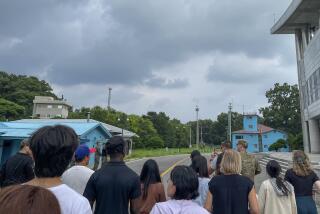North Korea Frees Japanese Researcher
- Share via
TOKYO — North Korea released a Japanese researcher and former reporter Tuesday after detaining him for two years on espionage charges, in an apparent attempt to ease tensions with its neighbor and gain maneuvering room. The move came less than a week before President Bush is to travel to Tokyo and Seoul, two of North Korea’s avowed enemies.
“North Korea is sending a clear-cut message,” said Satoshi Morimoto, a North Korea expert with Tokyo’s Takushoku University. “Money flowing to Pyongyang [the North Korean capital] has almost stopped. And North Korea is increasingly worried that the U.S. will expand its anti-terror campaign against them.”
Economic researcher Takashi Sugishima, 62, a retired reporter for Japan’s influential Nihon Keizai financial daily, was seized on Dec. 4, 1999, while part of a delegation visiting Pyongyang. Authorities accused him of spying for Japan and South Korea, a charge the two nations denied.
Experts say Tuesday’s release is part of a bid by Pyongyang to sidestep the growing political and economic pressure it faces. The U.S. campaign against terrorism had already made the Communist regime jittery even before President Bush’s State of the Union address last month identified North Korea, along with Iraq and Iran, as part of an “axis of evil.”
North Korea also finds itself financially strapped as is gears up for the expensive two-month “Arirang” festival to mark the birthdays of its leadership, designed to showcase the regime and maintain citizen loyalty.
Japan, whose citizens are traditionally a major source of funding for North Korea, recently raided the Chogin Tokyo Credit Union on suspicion of financial irregularities, deterring many depositors. Chogin has traditionally been a major conduit for money transferred by Japanese residents of North Korean descent to relatives in the North.
Japan is also taking a tougher line against North Korean seaborne and airborne incursions, which experts cite as a key source of illicit drug profits. In late December, Japan’s navy chased a suspected North Korean spy ship, which later sank.
North Korea also finds its traditional contacts within Japan’s ruling Liberal Democratic Party closed off as public opinion toward Pyongyang sours.
“They’re looking for some change with Japan, some sort of improvement,” said Masao Okonogi, a North Korea expert with Keio University.
Any thaw in relations faces huge hurdles, however, including war reparations and a resolution of the fates of the estimated 70 Japanese abducted from Europe or Japan by North Korean agents during the last 2 1/2 decades and forced to live in North Korea.
In an interview with the Yomiuri newspaper Tuesday, Sugishima said he was confined to his room during his two-year captivity and watched constantly by a minder. Whenever he was moved, he was blindfolded. He received three meals a day, occasionally including white rice.
*
Rie Sasaki of The Times’ Tokyo Bureau contributed to this report.
More to Read
Sign up for Essential California
The most important California stories and recommendations in your inbox every morning.
You may occasionally receive promotional content from the Los Angeles Times.













